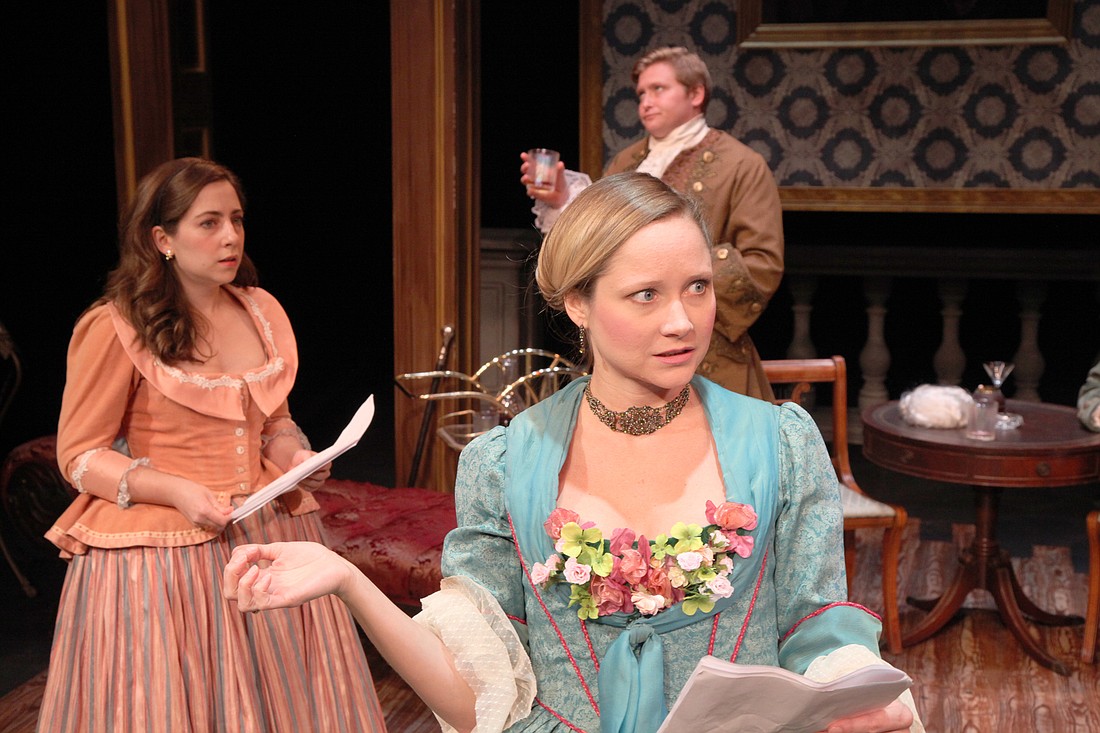- April 18, 2024
-
-
Loading

Loading

Jean Anouilh’s “The Rehearsal” makes Jean-Paul Sartre’s “No Exit” look like Pee Wee’s Playhouse. The wit is sparkling, but it’s the glint of well-sharpened knives.
This psychic rumble is the Asolo Conservatory’s latest production.
It all goes down in a French chateau. The year is 1950, but it looks like 1750. Poufy gowns and powdered wigs are the order of the day. The explanation? The bored aristocrats inhabiting this broke-down palace amuse their friends with amateur performances of 18th-century comedies. Marivaux’s “The Double Inconstancy” is next on the bill. A titular rehearsal is in progress as the play begins.
At first, it’s all charmingly eccentric. The charm quickly fades. The amateur production is really an elaborate form of seduction. The Count (Andrew Hardaway) has his eye on Lucille (Jenny Vallancourt), the guileless governess. The Count cleverly selected this particular play because of the part he wants Lucille to play. (Her character falls for his; he figures life will imitate art.) The Count speaks his seductive lines, some scripted, some not. Like a louche Richard III, he woos and tries to win her. Lucille gradually melts. The other costumed swells don’t like it one bit.
There’s no reason to like them. They live in a sick subculture of open marriages and closed hearts. With the exception of Lucille and the clownish Villebosse (Scott Shoemaker), nobody’s on the level. Everybody’s manipulating everybody else. In the jugular vein of “Dangerous Liaisons,” they amuse themselves with vicious mind games. Rich sociopaths with lots of free time. It’s always a bad combination.
The first act is a weird mirror maze where distorted reflections of art and reality melt together. That’s the fun part. The second act is more like …
Ah, but why spoil the ride?
A first-rate creative team brings Anouilh’s dark ride to life. Jeffrey Weber’s set is the perfect gilded cage for these odd birds. Sofia Gonzalez’s costumes smartly evoke the slightly inaccurate period garb that rich dilettantes would create. Movement coach Eliza Ladd puts these poseurs in the poses of 17th-century paintings and dramas. (Villebosse’s default stance is contrapposto.) Alex Pinchin’s sound design gets under your skin with a throbbing, subliminal bass. Chris McVicker’s’s lighting hits the perfect fever dream intensity.
Ashley Teague’s direction is mannered along the lines of a Mannerist painting. Everybody’s acting, posing and fronting. Nobody’s real. That’s the whole point, and she gets that point across.
The student actors aptly embody Anouilh’s oddities. Olivia Osol’s Countess is an icy human calculator on wheels. Literally. Thanks to recent surgery, the actress rolls around on a scooter. (This sounds distracting, but it’s serendipitously effective; Osol glides into her scenes like a silent cyborg.) In the role of the no-count Count, Hardaway (who reminds me of Raoul Julia) is a petulant man-boy with some shred of a soul. His pal, Hero (Dylan Crow), is a heroic drunk nursing an old grudge. He starts off as a funny drunk, and then turns ugly. He says, “I like to break things" — but he really means people. His soul is long gone. Katie Sah is effective as Hortensia, the Count’s “official” mistress according to the twisted rules these characters follow. Erik Meixelsperger is creepily protective as Damiens, Lucille’s godfather. (His interest is neither fatherly nor godly.) Shoemaker’s Villebosse (the Countess’ “official” boy-toy) comes off like a fugitive from another century — a backwater aristocrat who still thinks in terms of duels and honor. Vallancourt is heartbreaking as Lucille, the plain-Jane victim of the mind games. Innocence is not a survival trait with this crowd. I’m tempted to compare her to Justine Marquis de Sade’s long-suffering heroine. I don’t, because the playwright’s intentions aren’t sadistic.
Anouilh’s written a highly moral play about deeply immoral people. Their stratagems have a mind-boggling complexity. You could lie awake all night thinking about them. Unless a university is paying you, don’t. Let’s keep it simple.
Like “A Clockwork Orange” and “Richard III,” this play puts you inside the minds of some nasty characters. Anouilh’s “Becket or The Honour of God” showed a soul’s journey from reason to faith. Here, the journey goes in the opposite direction.
It’s a bad way to go. That’s all there is to it.